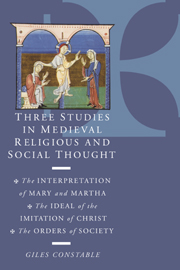 Three Studies in Medieval Religious and Social Thought
Three Studies in Medieval Religious and Social Thought Book contents
- Frontmatter
- Contents
- List of illustrations
- Preface
- List of abbreviations
- I THE INTERPRETATION OF MARY AND MARTHA
- II THE IDEAL OF THE IMITATION OF CHRIST
- III THE ORDERS OF SOCIETY
- Introduction
- The early Middle Ages
- The eleventh and twelfth centuries
- From the twelfth century to the end of the Middle Ages
- Appendix: mediocres (mediani, medii) in the Middle Ages
- Bibliography of secondary works
- Index of manuscripts
- Biblical index
- General index
The early Middle Ages
Published online by Cambridge University Press: 08 December 2009
- Frontmatter
- Contents
- List of illustrations
- Preface
- List of abbreviations
- I THE INTERPRETATION OF MARY AND MARTHA
- II THE IDEAL OF THE IMITATION OF CHRIST
- III THE ORDERS OF SOCIETY
- Introduction
- The early Middle Ages
- The eleventh and twelfth centuries
- From the twelfth century to the end of the Middle Ages
- Appendix: mediocres (mediani, medii) in the Middle Ages
- Bibliography of secondary works
- Index of manuscripts
- Biblical index
- General index
Summary
FROM THE CHURCH FATHERS TO THE NINTH CENTURY
it is unnecessary to examine here the social schema of Antiquity, except for Plato's famous division into gold, silver, and brass and iron, which stood respectively for the commanders, auxiliaries, and husbandmen and craftsmen. Each group should adhere to its own function, Plato said, adding that ‘The species will generally be preserved in the children.’ This passage was cited by Clement of Alexandria, and by Eusebius of Caesaria from Clement, who said that gold stood for Christians, silver for the Jews, and brass and iron for the Greeks. According to Origen, the patriarchs Abraham, Isaac, and Jacob represented the moral, natural, and contemplative (or ethical, physical, and theoretical) lives, and Noah, Daniel, and Job stood for the three ages before, during, and after the captivity of the Jews. A multitude of similar things was not many things but one. ‘For as many bodies are one body, and many sheep which perish are one sheep [Matthew 18.12; Luke 15.4], by this covenant all Noahs, Daniels, and Jobs are gathered in one Noah, Daniel, and Job.’ For Cyril of Alexandria, Noah, Daniel, and Job stood respectively for those who merited well of God through their faith, for wise men and contemplatives, and for those who will receive good things on account of their patience, and for Eucherius of Lyons they represented ‘three types (genera) of men’: the governors of the church, the saints and continent, and the married and lovers of justice.
- Type
- Chapter
- Information
- Three Studies in Medieval Religious and Social ThoughtThe Interpretation of Mary and Martha, the Ideal of the Imitation of Christ, the Orders of Society, pp. 267 - 288Publisher: Cambridge University PressPrint publication year: 1995


